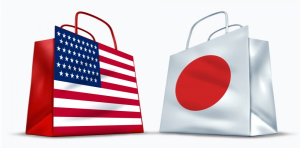Mixed reactions are coming out of Japan concerning Japan’s concerns over whether or not Donald Trump will become the next US president if elected this year in November. The Bank for International Settlements (BIS) demanded that Japan control its capital lending interest rates in 1990, or risk losing western markets for their products, so in many ways Japan has every right to fear Donald Trump coming into the presidency. This might be a large reason why Japan is re-militarizing and also why Japan is drawing closer to Russia with Russia’s Sergei Lavrov arriving in Tokyo next month to lay the ground work for a visit to Moscow in May, 2016 of Japan’s Shinzo Abe. If Japan is going to continue its mercantilist economy, it will need cheap resources out of eastern Russia including natural gas (LNG). Japan’s car manufacturer Toyota had record sales in the US last year, so is it any wonder Japan’s corporate leadership is concerned? And despite the TPP (Trans-Pacific Partnership), Japan remains strongly protectionist and will become even more so in the years to come.
________
Source: The Unz Review: An Alternative Media Selection
Japan Eyes Trump
Why the Media’s Silence on Japanese Protectionism Gives Trump Another Priceless Opening
Eamonn Fingleton • March 21, 2016 • 52 Comments
 In few places has Donald Trump’s rise caused more unease than in Tokyo. Indeed it is probably safe to say that, underneath an ostensibly imperturbable exterior, top Japanese officials are running far more scared than even Trump realizes.
In few places has Donald Trump’s rise caused more unease than in Tokyo. Indeed it is probably safe to say that, underneath an ostensibly imperturbable exterior, top Japanese officials are running far more scared than even Trump realizes.
They have a lot to be scared about. Much of what the Washington establishment thinks it knows about Japan is false, with the result that successive U.S. presidential administrations have never been able to bargain intelligently with Tokyo.
Here I will focus on Japan’s trading system, and I will address other potential flashpoints in future commentaries. Pace the mainstream American media, Japan remains as mercantilist as ever. As Trump has repeatedly pointed out, Japan poses as great a challenge for U.S. trade policymakers as China. In fact, the Japanese economic system could no more operate without high trade barriers than a Las Vegas nightclub could survive without muscular bouncers.
Tokyo’s forebodings about a revival of 1980s-style trade friction have been greatly exacerbated lately with the demise of Marco Rubio’s “savior” campaign. Not the least of those who aspired to be “saved” by Rubio were Japanese trade officials and their Washington lobbyists. Given that Rubio was bankrolled mainly by Norman Braman, a big Florida-based importer of high-end foreign cars, Rubio seemed a safe bet to perpetuate the “trade-doesn’t-matter” consensus of recent presidential administrations.
Assuming he is elected and keeps his promises, Trump would be the first president since Ronald Reagan to challenge Japanese mercantilism. He looks likely moreover to adopt a much tougher line than Reagan. Reagan not only felt constrained by the Cold War but naively accepted his vaunted “friend” Japanese Prime Minister Yasuhiro Nakasone’s assurances that, given a little time, Japan would fall into line. After all, almost the entire Japanese elite was supposedly already on board (at least that was the happy story promulgated in the Wall Street Journal’s editorial pages). Japan’s problem was ostensibly that a few remaining “backwoodsmen” were for a little while longer blocking progress but once they were jostled aside, a younger, more enlightened breed of Japanese official would enthusiastically embrace American-style free trade.
Well, here we are in 2016 – more than 35 years after Reagan took office and nearly twelve years since he died – and Japan remains as protectionist as ever.
Consider cars. Cars are worthy of special mention in part because they are by far the most important advanced manufactured item traded internationally (their electronics alone are as sophisticated as anything in an Apple iPhone). The car industry is also of special note because its trade patterns are easy to track.
That the Japanese car market is protected is the first thing you notice on setting foot in Japan. Except for a few token German cars that are visible mainly in central Tokyo, the cars on Japanese roads are Japanese. Drivers don’t have much choice. Foreign marques are systematically marginalized.
Korean cars provide a striking example: at last count their market share was less than 0.02 percent. Yet it is hardly as if the Koreans can’t make good cars: Hyundai competes to win against the Japanese in virtually every other market. In Japan, however, Hyundai sold an average of a mere 1,700 cars a year in the early years of the twenty-first century – a performance so miserable that in 2009 the company just gave up and shuttered its Japanese car marketing division.
Japan’s apologists have suggested that Hyundai’s problem was merely ethnic bias. In reality, such a bias explains nothing. Certainly in other respects Japanese consumers hardly seem allergic to things Korean. Japan’s most popular foreign cuisine, for instance, is Korean, and Korean culture is widely respected as a progenitor of Japanese culture (in much the same way that the British acknowledge a cultural debt to ancient Rome). Meanwhile there is the fact that ethnic Koreans constitute by far Japan’s largest minority. Even if anti-Korean bias is supposed to explain something, it can hardly explain why ethnic Koreans don’t buy Korean cars. Nor does it explain why ethnic Korean entrepreneurs (of whom there is a plentiful supply in Japan) don’t set up dealerships for Hyundai and the others. There is, too, the fact that in other products – including even auto components – Japanese and Korean companies do a thriving two-way business. The conclusion is inescapable that Japan pursues a deliberate policy of keeping Korean car imports close to zero.
Please go to the Unz Review website to read the entire article.
You must be logged in to post a comment.